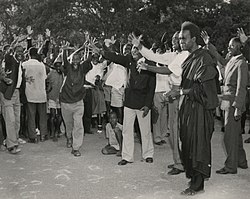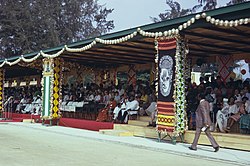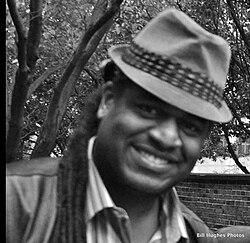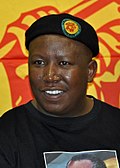Ruth Padel
IntroductionWelcome to the Pan-Africanism portal!
Bienvenue sur le portail panafricanisme!    Pan-Africanism is a nationalist movement that aims to encourage and strengthen bonds of solidarity between all indigenous peoples and diasporas of African ancestry. Based on a common goal dating back to the Atlantic slave trade, the Trans-Saharan slave trade, the Indian Ocean slave trade, the Red Sea slave trade, slavery in the Cape Colony (now South Africa), along with slavery in Mauritius, the movement extends beyond continental Africans with a substantial support base among the African diaspora in the Americas and Europe. Pan-Africanism is said to have its origins in the struggles of the African people against enslavement and colonization and this struggle may be traced back to the first resistance on slave ships—rebellions and suicides—through the constant plantation and colonial uprisings and the "Back to Africa" movements of the 19th century. Based on the belief that unity is vital to economic, social, and political progress, it aims to unify and uplift people of African ancestry. However, it was in the twentieth century that Pan Africanism emerged as a distinct political movement initially formed and led by people from the Diaspora (people of African heritage living outside of the Continent). In 1900, the Trinindadian barrister – Henry Sylvester Williams – called a conference that took place in Westminster Hall, London to "protest stealing of lands in the colonies, racial discrimination and deal with other issues of interest to Blacks". (Full article...) Selected article African nationalism is an umbrella term which refers to a group of political ideologies, mainly within Sub-Saharan Africa, which are based on the idea of national self-determination and the creation of nation states. Selected biography
Frances Cress Welsing (née Cress; March 18, 1935 – January 2, 2016) was an American Afrocentrist and psychiatrist. Her 1970 essay, The Cress Theory of Color-Confrontation and Racism (White Supremacy), offered her interpretation on the origins of what she described as white supremacy culture. She was the author of The Isis Papers: The Keys to the Colors (1991). Welsing caused controversy after she said that homosexuality among African-Americans was a ploy by white males to decrease the black population. Selected historyJim Crow laws were state and local laws that enforced racial segregation in the Southern United States. All were enacted in the late 19th and early 20th centuries by white Democratic-dominated state legislatures after the Reconstruction period, the laws were enforced until 1965. In practice, Jim Crow laws mandated racial segregation in all public facilities in the states of the former Confederate States of America, starting in the 1870s and 1880s, and were upheld in 1896, by the U.S. Supreme Court's "separate but equal" legal doctrine for facilities for African Americans, established with the court's decision in the case of Plessy vs. Ferguson. Moreover, public education had essentially been segregated since its establishment in most of the South, after the Civil War (1861–65). Selected culture
The traditional African religions (or traditional beliefs and practices of African people) are a set of highly diverse beliefs that include various ethnic religions. Generally, these traditions are oral rather than scriptural, include belief in a supreme creator, belief in spirits, veneration of the dead, use of magic and traditional medicine. Adherents of traditional religions in Sub-Saharan Africa are distributed among 43 countries and are estimated to number over 100 million. Although the majority of Africans are adherents of Christianity or Islam, African people often combine the practice of their traditional belief with the practice of Abrahamic religions. The two Abrahamic religions are widespread across Africa, though mostly concentrated in different areas. They have replaced indigenous African religions, but are often adapted to African cultural contexts and belief systems. West and Central African religious practices generally manifest themselves in communal ceremonies or divinatory rites in which members of the community, overcome by force (or ashe, nyama, etc.), are excited to the point of going into meditative trance in response to rhythmic or driving drumming or singing. One religious ceremony practiced in Gabon and Cameroon is the Okuyi, practiced by several Bantu ethnic groups. In this state, depending upon the region, drumming or instrumental rhythms played by respected musicians (each of which is unique to a given deity or ancestor), participants embody a deity or ancestor, energy or state of mind by performing distinct ritual movements or dances which further enhance their elevated consciousness. When this trance-like state is witnessed and understood, adherents are privy to a way of contemplating the pure or symbolic embodiment of a particular mindset or frame of reference. This builds skills at separating the feelings elicited by this mindset from their situational manifestations in daily life. Such separation and subsequent contemplation of the nature and sources of pure energy or feelings serves to help participants manage and accept them when they arise in mundane contexts. This facilitates better control and transformation of these energies into positive, culturally appropriate behavior, thought, and speech. Also, this practice can also give rise to those in these trances uttering words which, when interpreted by a culturally educated initiate or diviner, can provide insight into appropriate directions which the community (or individual) might take in accomplishing its goal. Selected imagesOrganisationsAll-African People's Revolutionary Party · African Society for Cultural Relations with Independent Africa · African Unification Front · African Union · African Queens and Women Cultural Leaders Network · Conseil de l'Entente · Convention People's Party · East African Community · Economic Freedom Fighters · Global Afrikan Congress · International African Service Bureau · International League for Darker People · Organisation of African Unity · Pan African Association · Pan-African Congress · Pan Africanist Congress of Azania · Rassemblement Démocratique Africain · Pan Africa Chemistry Network · Pan African Federation of Accountants · Pan-African Freedom Movement for East and Central Africa · Sahara and Sahel Observatory · UNIA-ACL · ZANU–PF
See also
& Festivals Photo by Helinä Rautavaara (1977) Publications
Films and TVAudios and videosDid you know ...that A. F. James MacArthur (pictured) broadcast his standoff with the Baltimore Police Department to 10,000 online listeners?
Selected quotesIn addressing imperialism at a Salisbury (Southern Rhodesia) meeting held on 9 April 1962, the former President of Zimbabwe Robert Mugabe delivered the following speech:
Pan-Africanism topicsCategoriesThings you can do
Related portalsAssociated WikimediaThe following Wikimedia Foundation sister projects provide more on this subject:
Discover Wikipedia using portals
| |||||||||||||||||||||||||||||||||

 Read
Read
 AUTHORPÆDIA is hosted by Authorpædia Foundation, Inc. a U.S. non-profit organization.
AUTHORPÆDIA is hosted by Authorpædia Foundation, Inc. a U.S. non-profit organization.































